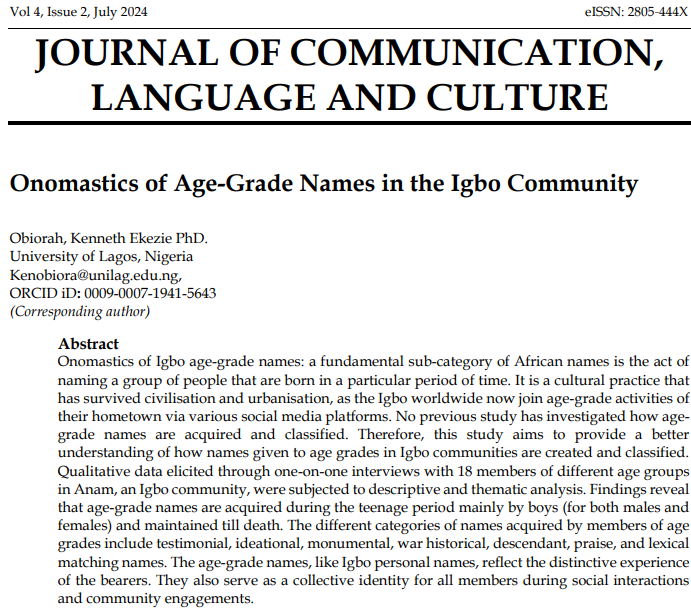Onomastics of Age-Grade Names in the Igbo Community
Main Article Content
Abstract
Onomastics of Igbo age-grade names: a fundamental sub-category of African names is the act of naming a group of people that are born in a particular period of time. It is a cultural practice that has survived civilisation and urbanisation, as the Igbo worldwide now join age-grade activities of their hometown via various social media platforms. No previous study has investigated how age-grade names are acquired and classified. Therefore, this study aims to provide a better understanding of how names given to age grades in Igbo communities are created and classified. Qualitative data elicited through one-on-one interviews with 18 members of different age groups in Anam, an Igbo community, were subjected to descriptive and thematic analysis. Findings reveal that age-grade names are acquired during the teenage period mainly by boys (for both males and females) and maintained till death. The different categories of names acquired by members of age grades include testimonial, ideational, monumental, war historical, descendant, praise, and lexical matching names. The age-grade names, like Igbo personal names, reflect the distinctive experience of the bearers. They also serve as a collective identity for all members during social interactions and community engagements.
Article Details
References
Anbessa, T. & Tafesse, G. M. (2019). A Linguistics Analysis of Personal Names in Sidaama. Journal of Afroasiatic Languages, History and Culture. 8(1) 97-140
Babalola, O. & Adedeji, M. (2020). Conspectus of Age Grade System in Ikere-Ekiti. Sapientia Global Journal of Arts, Humanity & Development Studies. 4(2) 479–488.
Clark, S. (2010). From Adam to Zara; Popularity of Names in region of the United States. FAST-US-7 (TRENAK15) United States Popular Culture (Hopkins) Department of Translation Studies, University of Tampere.
Ezeogidi, C. (2020). Resuscitating the Age Grade Associations and Women Guilds in Igbo Land for Effective Conflict Management Mechanism and Resolution. Available at SSRN: https://ssrn.com/abstract=3563531 or http://dx.doi.org/10.2139/
Igwilo, M. A. (2014). The Role of Nnannebuife Age Grade in Promoting Rural Development in Nsugbe Community in Anambra East L.G.A. Anambra State. B.Sc Project, Cartas University.
Iwundu, M. (1994). Igbo Anthopynyms: A Socio-Semantic Analysis. Unpublished Ph.D Thesis. University of Nigeria, Nsukka.
Kammelu, N. C. (2008). Reconstruction of Igbo Personal Names: The Phono-Semantic Implications. In Ikwubuzo Iwu, Ohiri-Aniche Chinyere, Nnabuihe Chigozie. Udezuluigbo (Eds.), A Festschrift in Honour of Sam Uzochukwu (pp208-223). Lagos: Green Olive Publisher
Kenneth. E. O. (2021). Phonetic Variation and Tones in Igbo Personal Names. Sapiential Global Journal of Arts, Humanities and Developmental Studies. Vol 4. 397-404
Maduabuchi, A. (2014). “Causative in Igbo Personal Names,” Journal of Universal Language 15(22): 1-33.
Mba, A. U., Anene J. & Mba C. A. (2023). The Contribution of Age Grade System in Community development in Ohafia Land in Abia State, Nigeria. Scholarly Journal of Social Science Research. 2(3) 1-18
Mmadike, B..( 2014). “Anthropolinguistics Study of Ala Names in Igbo.” Journal of Humantics and Social Social 19( 10) 11-19.
Ndukwe, C. (2015). “Changes and Continuity in Igbo Age Grade Practice in Nigeria: A Study of the Igbo Traditional and Modern Administrative System.” Journal of Policy and Development Studies. 19(3):176-184.
Nkamigbo, L. (2019). The Sociolinguistics Study of Igbo Personal Names. Journal of Linguistics, Language and Culture. 16. 158-178
Obiorah, K. E. (2019). “A Perceptual Comparative Study of Anam and Standard Igbo Sounds.” Igede Igbo, Journal of Igbo Studies Department of Linguistics, African and Asian Studies, University of Lagos 4(1): 50-63.
Ogbonna, O. (2008). “Language Change: Some Emerging Evidence from Igbo Proper Names.” In Ikwubuzo Iwu, Ohiri-Aniche Chinyere, Nnabuihe, Chigozie. Udezuluigbo, (Eds.), A Festschrift in Honour of Sam Uzochukwu. (pp 224-240). Green Olive Publisher.
Onukawa, C. ( 2008). "Ontological Hierarchies Among The Igbo: Anthropolinguistic Evidence From Ka-Expressions and Personal Names. In Ikwubuzo Iwu, Ohiri-Aniche Chinyere, Nnabuihe, Chigozie, (Eds,) Udezuluigbo, A Festschrift in Honour of Sam Uzochukwu. (pp 214-257). Green Olive Publisher.
Onumajuru, V. (2016). A Semantic and Pragmatic Analysis of Names. African Research Review, An International Multi-disciplinary Journal 10 (41) 307-324.
Onuorah, C. (2015) Emume Echimechi Oba Anam. Unpublished B.A Project. University of Lagos, Lagos.
Onuorah, J. (2016).Clipping of Igbo Personal Names: A Optimality Theory Approach. Journal of Linguistics, Language and Culture 3(1). 28-45
Shahnoza A. (2023) The Problem of Analysis of Onomastics Units in Alpomis and boburnoma. Accessed online 03/11/2023/ DOI:10.52773/bobur.conf.2023.25.09/BDES5345
Ubahakwe, E. (1981). Igbo Names: Their Structure and Their Meaning. Ibadan: Daystar Press.

